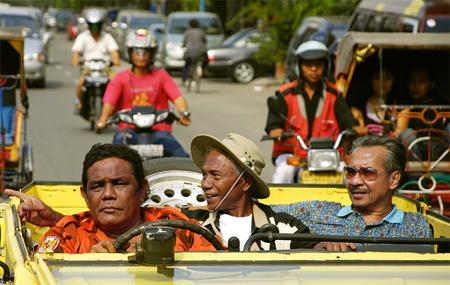The stories we choose to tell about our past define how we perceive ourselves as a people. "Sculpting the Past" is an investigation of how our cultural heritage of film can be put into play in new ways, thus bringing out new perspectives for both older and younger generations. The exhibition, which takes place at the DFI Filmhouse in Copenhagen, examines how film is not only a cultural signifier, but also a powerful conveyer of history – and, at times, certain versions of history.
The exhibition is divided into two sections: an archival installation, "Stories of the Occupation", and a film installation, "Acts of Killing". Bringing together Joshua Oppenheimer's groundbreaking, Danish-produced documentary film "The Act of Killing" with a selection of Danish propaganda films made during the German occupation, "Sculpting the Past" sheds light on our collective repressions throughout history and adds new dimensions to the concept of genocide, remorse and reconciliation.
The exhibition highlights what happens when we write history and makes a point of asking: Who gets to define the past? In the midst of all of this lies the power of the moving image: that of film, television, commercials, and propaganda. Today, film and media play a pivotal part in shaping our view of the world. "Sculpting the Past" exposes this truth and asks us to reconsider, and perhaps, revise our conceptions.
The exhibition, running through 20 October, is accompanied by a new permanent website, sculptingthepast.dk, which gives access to 77 newly digitised documentaries and experimental films from the archives of the Danish Film Institute. The films, ranging from the mid-1930s to the late 1980s, make up a digital archive of stories about the Danish society, thus expanding, revitalising and adding nuances to the stories we tell about ourselves as a people and, just as important, how we have perceived "the other" throughout history.
"The Act of Killing" is produced by Danish production company Final Cut for Real.
Joshua Oppenheimer at the DFI Filmhouse
Learn more about the ideas behind the exhibition in curator Cecilie Gravesen's interview with Joshua Oppenheimer:
Joshua Oppenheimer and Danish WWII historian Lars-Martin Sørensen about our collective memory:
Find more information at www.sculptingthepast.dk (Danish)





